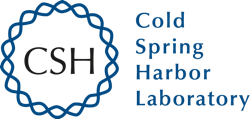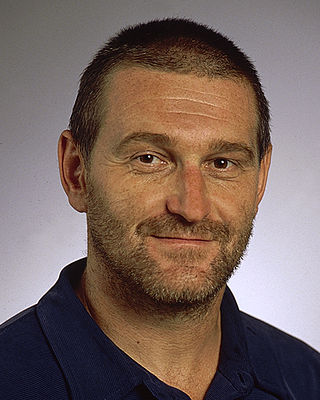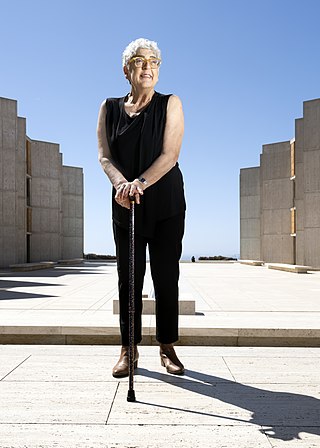Related Research Articles

The Salk Institute for Biological Studies is a scientific research institute located in the La Jolla community of San Diego, California, U.S. The independent, non-profit institute was founded in 1960 by Jonas Salk, the developer of the polio vaccine; among the founding consultants were Jacob Bronowski and Francis Crick. Construction of the research facilities began in spring of 1962. The Salk Institute consistently ranks among the top institutions in the US in terms of research output and quality in the life sciences. In 2004, the Times Higher Education Supplement ranked Salk as the world's top biomedicine research institute, and in 2009 it was ranked number one globally by ScienceWatch in the neuroscience and behavior areas.

Cold Spring Harbor Laboratory (CSHL) is a private, non-profit institution with research programs focusing on cancer, neuroscience, plant biology, genomics, and quantitative biology.

Howard Robert Horvitz ForMemRS NAS AAA&S APS NAM is an American biologist best known for his research on the nematode worm Caenorhabditis elegans, for which he was awarded the 2002 Nobel Prize in Physiology or Medicine, together with Sydney Brenner and John E. Sulston, whose "seminal discoveries concerning the genetic regulation of organ development and programmed cell death" were "important for medical research and have shed new light on the pathogenesis of many diseases".
Ronald Mark Evans is an American Biologist, Professor and Head of the Salk’s Gene Expression Laboratory, and the March of Dimes Chair in Molecular and Developmental Biology at the Salk Institute for Biological Studies in La Jolla, California and a Howard Hughes Medical Institute Investigator. Dr. Ronald M. Evans is known for his original discoveries of nuclear hormone receptors (NR), a special class of transcriptional factor, and the elucidation of their universal mechanism of action, a process that governs how lipophilic hormones and drugs regulate virtually every developmental and metabolic pathway in animals and humans. Nowadays, NRs are among the most widely investigated group of pharmaceutical targets in the world, already yielding benefits in drug discovery for cancer, muscular dystrophies, osteoporosis, type II diabetes, obesity, and cardiovascular diseases. His current research focuses on the function of nuclear hormone signaling and their function in metabolism and cancer.
Elliot Meyerowitz is an American biologist.

Susan Randi Wessler, ForMemRS, is an American plant molecular biologist and geneticist. She is Distinguished Professor of Genetics at the University of California, Riverside (UCR).

Arthur L. Horwich is an American biologist and Sterling Professor of Genetics and Pediatrics at the Yale School of Medicine. Horwich has also been a Howard Hughes Medical Institute investigator since 1990. His research into protein folding uncovered the action of chaperonins, protein complexes that assist the folding of other proteins; Horwich first published this work in 1989.
Gerald Mayer Rubin is an American biologist, notable for pioneering the use of transposable P elements in genetics, and for leading the public project to sequence the Drosophila melanogaster genome. Related to his genomics work, Rubin's lab is notable for development of genetic and genomics tools and studies of signal transduction and gene regulation. Rubin also serves as a vice president of the Howard Hughes Medical Institute and executive director of the Janelia Research Campus.

Angelika Amon was an Austrian American molecular and cell biologist, and the Kathleen and Curtis Marble Professor in Cancer Research at the Massachusetts Institute of Technology (MIT) in Cambridge, Massachusetts, United States. Amon's research centered on how chromosomes are regulated, duplicated, and partitioned in the cell cycle. Amon was elected to the American Academy of Arts and Sciences in 2017.
Utpal Banerjee is a distinguished professor of the department of molecular, cell and developmental biology at UCLA. He obtained his Bachelor of Science degree in chemistry from St. Stephen's College, Delhi University, India and obtained his Master of Science degree in physical chemistry from the Indian Institute of Technology, Kanpur, India. In 1984, he obtained a PhD in chemistry from the California Institute of Technology where he was also a postdoctoral Fellow in the laboratory of Seymour Benzer from 1984-1988.
Gerald Ralph Fink is an American biologist, who was Director of the Whitehead Institute at MIT from 1990–2001. He graduated from Amherst College in 1962 and received a Ph.D. from Yale University in 1965, having elucidated the histidine pathway in budding yeast, Saccharomyces cerevisiae. After postdoctoral study at the National Institutes of Health with Bruce Ames on the regulation of the histidine operon of Salmonella, in 1967 he joined Cornell University where he became a Professor of Genetics and pursued the study of the HIS4 region of yeast. In 1982 he became a founding member of the Whitehead Institute and Professor of Genetics at MIT. Dr. Fink was elected to the United States National Academy of Sciences in 1981, to the Institute of Medicine in 1996, and to the American Philosophical Society in 2003.

Pavel Arkadevich Pevzner is the Ronald R. Taylor Professor of Computer Science and director of the NIH Center for Computational Mass Spectrometry at University of California, San Diego. He serves on the editorial board of PLoS Computational Biology and he is a member of the Genome Institute of Singapore scientific advisory board.
Inder Mohan Verma is an Indian American molecular biologist, the former Cancer Society Professor of Molecular Biology in the Laboratory of Genetics at the Salk Institute for Biological Studies and the University of California, San Diego. He is recognized for seminal discoveries in the fields of cancer, immunology, and gene therapy.

Joanne Chory is an American plant biologist and geneticist. Chory is a professor and director of the Plant Molecular and Cellular Biology Laboratory, at the Salk Institute for Biological Studies and an investigator of the Howard Hughes Medical Institute.
Xuemei Chen is a Chinese-American molecular biologist. She is the Furuta Chair Professor in the Department of Botany and Plant Sciences at the University of California, Riverside. She was elected to the US National Academy of Sciences in 2013.
Robert Anthony Martienssen is a British plant biologist, Howard Hughes Medical Institute–Gordon and Betty Moore Foundation investigator, and professor at Cold Spring Harbor Laboratory, US.

Julie Law is an American molecular and cellular biologist. Law's pioneering work on DNA methylation patterns led to the discovery of the role of the CLASSY protein family in DNA methylation. Law is currently an associate professor at the Salk Institute for Biological Studies.
Joseph Jez is a Howard Hughes Medical Institute Professor and Spencer T. Olin Professor of Biology at Washington University in St. Louis. He has served as the Chair of the Washington University Biology Department since 2018. His research focuses on the effect of environmental changes on biochemical pathways in plants, aiming to apply this research to present-day agricultural and environmental issues.
Martin Hetzer is an Austrian-born molecular biologist and President of the Institute of Science and Technology Austria (ISTA). He is holder of the Jesse and Caryl Philips Foundation Chair in Molecular Cell Biology. His research focuses on fundamental aspects of organismal aging with a special focus on the heart and central nervous system. His laboratory has also made important contributions in the area of cancer research and cell differentiation.
Joanna Wysocka is a biologist, a professor at Stanford University, and a Howard Hughes Medical Institute Investigator. She specializes in chemical and systems biology as well as developmental biology.
References
- ↑ "Joseph R. Ecker- Salk Institute – Faculty & Research – Faculty". www.salk.edu. Retrieved 2015-09-26.
- ↑ "Joseph Ecker". biology.ucsd.edu. Retrieved 2015-09-26.
- 1 2 Trivedi, Bijal P. (27 Feb 2007). "Profile of Joseph R. Ecker". Proceedings of the National Academy of Sciences of the United States of America . 104 (9): 3023–3025. doi: 10.1073/pnas.0607124104 .
- ↑ "Joseph R. Ecker, PhD | HHMI.org" . Retrieved 2015-09-26.
- ↑ Wessler, Susan R. (2011-04-01). "The 2011 George W. Beadle Award Joseph R. Ecker". Genetics. 187 (4): 993–994. doi:10.1534/genetics.111.127852. ISSN 0016-6731. PMC 4238846 .
- ↑ "InsideSalk – 02|10 Issue "TIME" Ranks Epigenome Study No. 2 Scientific Discovery of 2009" . Retrieved 2015-09-26.